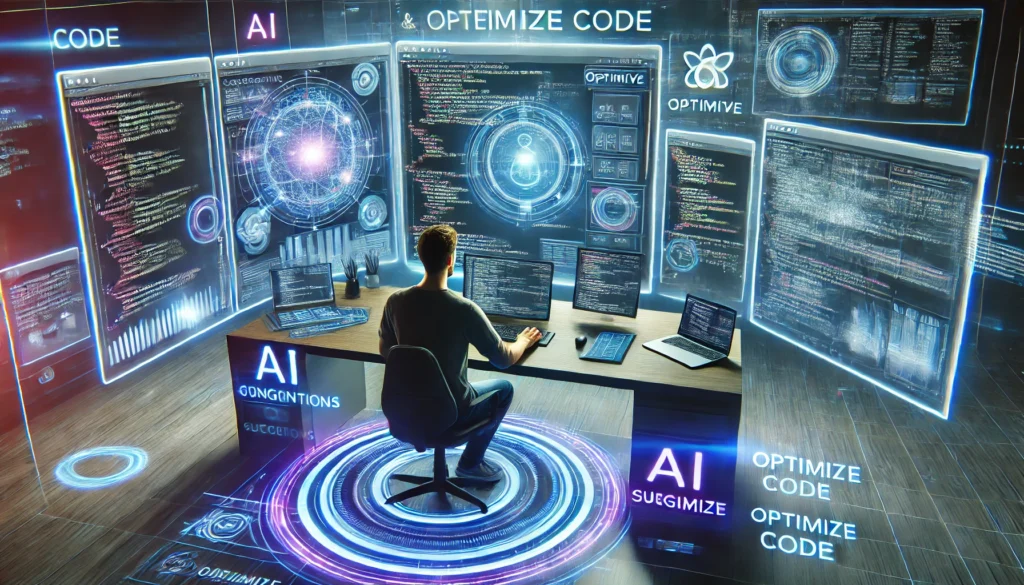Introduction
In recent years, artificial intelligence (AI) has been making waves across industries, and the software development world is no exception. One of the most intriguing and transformative applications of AI is in the field of code writing. AI-powered tools like GitHub Copilot, OpenAI’s Codex, and even ChatGPT are rapidly becoming an integral part of the modern developer’s toolkit. These generative AI tools are revolutionizing the way code is written, reviewed, and optimized, making development faster, more efficient, and even more accessible for beginners.
In this blog, we’ll explore how generative AI is changing the landscape of software development, its benefits, limitations, and what the future holds for developers.
What is Generative AI in Code Writing?
Generative AI, in the context of software development, refers to AI systems that can generate code based on natural language prompts or incomplete code snippets. Unlike traditional IDE features like autocompletion, which suggest or fill in predefined code templates, generative AI systems can write entire functions, classes, and sometimes even whole programs with minimal input from the developer.
These systems rely on large-scale machine learning models trained on vast repositories of code from platforms like GitHub, Stack Overflow, and other open-source projects. By analyzing this data, AI tools learn to understand programming patterns, syntax, and logic structures, enabling them to generate human-like code across a variety of programming languages.
Popular examples of generative AI tools include:
- GitHub Copilot: Built on OpenAI’s Codex model, Copilot suggests entire lines or blocks of code based on the context of the current file.
- ChatGPT: While primarily a conversational AI, ChatGPT has demonstrated impressive abilities to generate code, explain programming concepts, and help debug code.
- Tabnine: A tool that integrates with most IDEs and provides AI-driven code completion.
How Generative AI is Revolutionizing Development
1. Increased Productivity and Speed
AI-powered code writing tools can significantly boost developer productivity by providing smart code completions, suggestions, and solutions to common coding problems. This not only speeds up the process of writing code but also reduces the mental effort required to remember syntax or details about specific APIs. Developers can spend more time focusing on solving problems and building features rather than bogging down in repetitive tasks.
For example, GitHub Copilot can automatically generate entire functions based on a simple comment, eliminating the need for developers to search for examples or reference documentation. This allows them to rapidly prototype and experiment, accelerating the software development lifecycle.
2. Lower Barrier to Entry for Beginners
Generative AI tools are leveling the playing field for novice programmers. New developers often struggle with common programming issues, from understanding syntax to solving algorithmic challenges. By providing code examples and explanations in real time, AI systems help beginners learn as they go.
Imagine a beginner asking ChatGPT for help with a Python function to sort a list of numbers. Not only will the AI provide the correct code, but it can also explain why certain lines are written in a particular way, enhancing the learning experience.
3. Improved Code Quality and Consistency
Another key advantage of generative AI is its ability to ensure consistent coding practices. AI models are trained on best practices and coding standards, which helps developers adhere to established guidelines. These tools can even suggest refactoring opportunities to improve code readability, efficiency, and maintainability.
Moreover, AI can help identify bugs early in the process. For example, GitHub Copilot may point out potential issues in a function, such as missing error handling or incorrect variable types, before the code is even executed. This proactive debugging makes software development more reliable and less error-prone.
4. Cross-Language Flexibility
Generative AI tools aren’t limited to a single programming language. Many AI systems are designed to support a wide variety of languages, from Python and JavaScript to C++ and Java. This makes them incredibly versatile for full-stack development, where developers often need to work with multiple languages and frameworks.
For example, a developer might be building a full-stack web application with a front-end in React (JavaScript) and a back-end in Node.js. Using a generative AI tool like GitHub Copilot, they can seamlessly switch between languages and get accurate code suggestions for both the frontend and backend with minimal effort.
The Challenges and Limitations of Generative AI in Code Writing
While the promise of generative AI is enormous, it’s not without its challenges and limitations.
1. Dependence on Quality of Training Data
Generative AI models are only as good as the data they are trained on. If the training dataset contains suboptimal, insecure, or outdated code, the AI-generated code may inherit these flaws. For example, an AI might suggest a code pattern that’s no longer recommended due to security vulnerabilities or performance concerns.
It’s crucial for developers to verify the code produced by AI tools, especially in mission-critical applications. Trusting AI blindly without human oversight can lead to potential issues in production code.
2. Limited Understanding of Business Logic
While AI excels at writing syntax and following patterns, it often struggles with understanding the nuances of business logic. AI-generated code might work well for simple tasks but may fail when the code needs to account for complex requirements or edge cases that depend on the unique context of a project.
Developers still need to have a deep understanding of the problem domain and apply their expertise to refine and adapt the AI-generated solutions.
3. Ethical and Security Concerns
As with any AI-driven technology, there are ethical concerns around the use of generative AI in code writing. AI tools like GitHub Copilot have raised questions about intellectual property, as the models are trained on publicly available code that may be copyrighted. This could lead to potential copyright violations if AI suggests or generates code that too closely resembles proprietary code.
Additionally, AI systems may inadvertently generate insecure code, as they are unable to fully grasp the security implications of certain programming decisions. Developers must remain vigilant about security best practices when working with AI-generated code.
The Future of AI in Code Writing
Despite these challenges, the future of AI in code writing looks incredibly promising. As AI models continue to evolve and become more sophisticated, we can expect even greater advancements in code generation tools. Some possible future developments include:
- Increased Domain-Specific AI: AI models could be fine-tuned to specialize in specific industries or application types, such as AI-powered tools specifically designed for building healthcare apps or financial software.
- Better Understanding of Business Logic: As AI models become more advanced, they may be able to better understand the context of business logic and make smarter, more context-aware suggestions.
- Collaborative Development Environments: Future AI tools may integrate more seamlessly into collaborative development environments, where multiple developers can leverage AI-generated code to work together more efficiently.

Conclusion
Generative AI is poised to revolutionize software development by making code writing faster, more efficient, and accessible to a broader audience. While there are challenges to overcome, particularly around quality assurance and security, the potential benefits for developers are immense. As these tools continue to improve, they will reshape how we write, review, and optimize code, making development more productive and enabling developers to focus on the creative and problem-solving aspects of building software.
For developers, the future is clear: embrace the power of AI to enhance your coding workflows, improve code quality, and unlock new levels of productivity. The revolution in code writing is already here, and it’s only going to get more exciting.






Leave a Reply